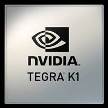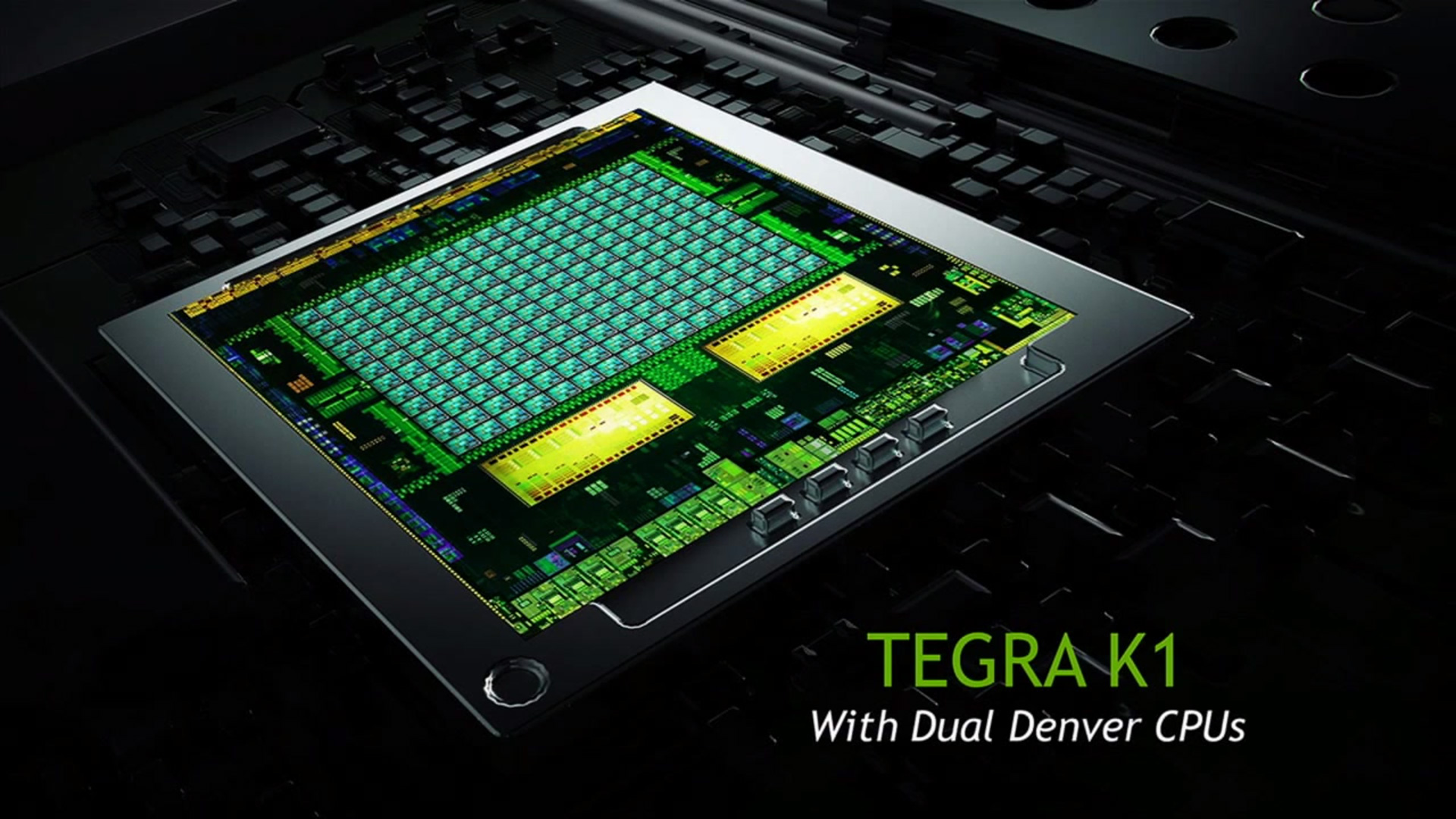
NVIDIA svela il rivoluzionario processore mobile Tegra K1, un super chip con 192 core basato sulla stessa architettura NVIDIA Kepler che equipaggia le più veloci GPU del mondo, come NVIDIA GeForce GTX 780 Ti. Per la prima volta, i giochi per PC di prossima generazione saranno, quindi, disponibili anche su piattaforma mobile.
Il processore Tegra K1 pone nuovi standard in ambito mobile supportando le ultime tecnologie per il PC gaming e consentendo, quindi, di giocare con sofisticati motori come Unreal Engine 4 di Epic Games. Offre capacità computazionali avanzate per velocizzare lo sviluppo di applicazioni di computer vision e riconoscimento vocale, e la sua straordinaria efficienza assicura performance più elevate di qualsiasi altra GPU mobile a parità di consumi energetici.
"Negli ultimi due decenni, NVIDIA ha inventato la GPU e ha sviluppato più tecnologie grafiche di ogni altra azienda.", ha dichiarato Jen-Hsun Huang, co-fondatore e CEO, NVIDIA. "Con Tegra K1, portiamo questa esperienza anche nel settore mobile, colmando un gap che consente ora agli sviluppatori di realizzare giochi next-gen e app che possono essere eseguiti su qualsiasi dispositivo."
Tegra K1 è disponibile in due versioni compatibili "pin-to-pin". La prima utilizza un quad-core a 32-bit, la CPU 4-Plus-1 ARM Cortex A15. La seconda versione utilizza una dual CPU Super Core NVIDIA-designed a 64 bit. Questa CPU (nome in codice "Denver") assicura performance single-thread e multi-thread molto elevate. E' basata su architettura ARMv8, che porta l'efficienza energetica dei processori ARM nel computing a 64-bit.
Entrambe le versioni di Tegra K1 assicurano capacità grafiche e di visual computing sorprendenti, grazie alla GPU NVIDIA Kepler con 192 core. La versione a 32 bit sarà disponibile sui dispositivi nella prima metà del 2014, mentre la versione a 64 bit è attesa per la seconda metà dell'anno.
Simply Unreal: si affermano nuovi e sorprendenti standard per il gaming
Tegra K1 offre pieno supporto alle più recenti tecnologie per il PC gaming, tra cui DirectX 11, OpenGL 4.4 e tessellation, consentendo agli sviluppatori di giochi per PC e console di portare i loro titoli anche su dispositivi portatili.
Queste caratteristiche consentono a Tegra K1 di gestire anche i game engine più avanzati, come Unreal Engine 4, che è alla base centinaia di giochi hi-end per PC e rappresenta il motore di maggior successo del momento.
Tegra K1 è anche il primo processore mobile a offrire performance grafiche paragonabili a quelle delle nuove console (Xbox One, PlayStation 4) e superiori a Xbox 360 e PlayStation 3, il tutto nel palmo della mano.
"Con l'arrivo di questo processore rivoluzionario, possiamo prendere applicazioni per PC o console e utilizzarle su Tegra.", ha affermato Tim Sweeney, fondatore di Epic Games e sviluppatore di Unreal Engine. "D'ora in avanti assisteremo a un progressivo assottigliamento del gap tra le performance gaming sui PC hi-end e quelle su piattaforma mobile fino a vederlo scomparire."
Computationally Advanced: arrivano nuove opportunità creative
Tegra K1 è il primo processore a portare capacità computazionali avanzate e introdurre nuove opportunità per il mondo mobile, grazie alla sua avanzata architettura GPU.
E' anche il primo processore mobile a supportare NVIDIA CUDA, la piattaforma per il parallel computing più pervasiva al mondo. Scaricato dagli sviluppatori oltre 2 milioni di volte, CUDA ha dato loro la possibilità di creare applicazioni GPU-accelerated allo stato dell'arte nell'ambito della computer vision, dell'imaging, del riconoscimento vocale, del video editing e molto altro.
Stunningly Efficient: il raggiungimento di nuovi livelli di benchmark
In aggiunta a nuove capacità grafiche e computazionali, Tegra K1 garantisce un'efficienza senza precedenti. La GPU Kepler che equipaggia Tegra K1 è 1,5 volte più efficiente di altre GPU mobile. Questo si traduce in performance superiori a parità di consumo energetico e in una migliore esperienza per le applicazioni gaming e GPU-accelerated.1
Kepler, introdotta inizialmente sui sistemi desktop e sui notebook e successivamente su workstation e supercomputer, è l'architettura GPU più veloce ed efficiente al mondo. Finora sono state vendute decine di milioni di schede grafiche basate su Kepler, tra cui la GeForce GTX 780 Ti , e numerosi sistemi che le integrano.
"Kepler equipaggia tutti i 10 supercomputer più efficienti al mondo.", ha dichiarato Linley Gwennap di Linley Group. "Scalando questa tecnologia, NVIDIA pone oggi nuovi standard per i dispositivi portatili."

[Immagine ad alta risoluzione]

[Immagine ad alta risoluzione]

NVIDIA today unveiled the revolutionary Tegra K1 mobile processor, a 192-core super chip featuring the same NVIDIA Kepler architecture that powers the fastest GPU on the planet, the NVIDIA GeForce GTX 780 Ti. For the first time, next-generation PC gaming will now be available on mobile platforms.
The Tegra K1 processor sets new mobile standards by supporting the latest PC-class gaming technologies, enabling it to run sophisticated gaming engines like Epic Games' Unreal Engine 4. It delivers advanced computation capabilities to speed the development of applications for computer vision and speech recognition. And its extraordinary efficiency delivers higher performance than any other mobile GPU at the same power level.
"Over the past two decades, NVIDIA invented the GPU and has developed more graphics technologies than any other company," said Jen-Hsun Huang, co-founder and CEO, NVIDIA. "With Tegra K1, we're bringing that heritage to mobile. It bridges the gap for developers, who can now build next-gen games and apps that will run on any device."
Tegra K1 is offered in two pin-to-pin compatible versions. The first version uses a 32-bit quad-core, 4-Plus-1 ARM Cortex A15 CPU. The second version uses a custom, NVIDIA-designed 64-bit dual Super Core CPU. This CPU (codenamed "Denver") delivers very high single-thread and multi-thread performance. It is based on the ARMv8 architecture, which brings the energy-efficient heritage of ARM processor technology to 64-bit computing.
Both versions of Tegra K1 deliver stunning graphics and visual computing capabilities powered by the 192-core NVIDIA Kepler GPU. The 32-bit version is expected in devices in the first half of 2014, while the 64-bit version is expected in devices in the second half of the year.
Simply Unreal:Setting Stunning New Gaming Standards
Tegra K1 provides full support for the latest PC-class gaming technologies -- including DirectX 11, OpenGL 4.4 and tessellation. These capabilities will enable PC and console game developers to finally bring their stunning, visually rich titles to mobile devices.
Such features enable Tegra K1 to run the world's most advanced game engine, Unreal Engine 4. Unreal Engine is the most successful commercially licensed game engine, powering hundreds of games on high-end PCs and consoles.
Tegra K1 is also the first mobile processor to deliver the same graphics features as the next generation of consoles (Xbox One, PlayStation 4) and faster performance than current generation consoles (Xbox 360, PlayStation 3), all in the palm of your hand.
"With the introduction of this revolutionary processor, we can take applications that run on PC or console and run it on Tegra," said Tim Sweeney, founder of Epic Games and developer of Unreal Engine. "From here onward, I think we're going to see the performance and feature gap between mobile and PC high-end gaming continue to narrow to the point where the difference between the platforms really blurs."
Computationally Advanced:Delivering New Creative Capabilities
Tegra K1 is the first processor to bring advanced computational capabilities to mobile -- leveraging its advanced GPU to deliver new mobile experiences.
It is also the first mobile processor to support NVIDIA CUDA -- the world's most pervasive parallel computing platform. Developers have downloaded CUDA more than 2 million times to create cutting-edge GPU-accelerated applications for computer vision, advanced imaging, speech recognition, video editing and more.
Stunningly Efficient: Establishing New Benchmarks
In addition to its graphics and compute capabilities, Tegra K1 delivers breakthrough efficiency. The Kepler GPU at the heart of Tegra K1 is 1.5 times more efficient than other mobile GPUs. This results in faster performance in the same power envelope and a better experience for gaming and GPU-accelerated applications.(1)
Kepler -- first introduced in desktop and notebook systems, and later brought to workstations and supercomputers -- is the world's fastest and most energy-efficient GPU architecture. Tens of millions of Kepler-based graphics cards and systems have been shipped, including the GeForce GTX 780 Ti.
"Kepler powers all 10 of the world's most energy-efficient supercomputers," said Linley Gwennap of the Linley Group. "By scaling this technology down, NVIDIA has set the new standard for what's possible in mobile devices."
News Source: NVIDIA Press Release
Links

